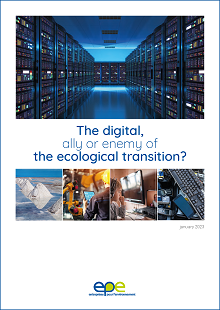Entreprises pour l’Environnement Report Examines the Impact of Digitalization on the Environment
A recent report from Entreprises pour l’Environnement (EpE), a consortium of French and international large companies from all sectors of the economy committed to the ecological transition, “examines the strategies and practices designed to reduce the impact of digital technologies, measure their environmental footprint and monitor their uses by companies in order to accelerate the ecological transition”. Entitled “The digital, ally or enemy of the ecological transition?”, the report aims to help organizations balance digital transformation with carbon emissions.
Countless industries have already begun digital transformations, and those lagging behind have no choice but to follow. While digitalization provides numerous benefits such as improved efficiency and productivity, better use of data, and automation, this technological revolution comes at a price. The report finds for instance that “In France alone, annual consumption of digital goods and services accounts for 2.5% of the country’s overall carbon footprint, 10% of power consumption and 62.5 million tonnes of resources consumed.” This trend is expected to accelerate, and “France’s carbon footprint from digitalisation could jump 60% by 2040 if nothing is done to limit it.”
There is hope though. The report also provides best practices for organizations to reduce their carbon footprint as they digitally transform, through measuring greenhouse gas emissions and leveraging tools and green IT practices. By following these recommendations, organizations can improve their operations while reducing carbon emissions.
LF Energy Strategic Member RTE is highlighted as a case study in the report, and discusses why open source technologies are the best way of successfully transforming digitally while mitigating environmental impacts.
Download the full report today to learn how to ensure your digital transformation project does not negatively impact your carbon footprint..
Learn more about Entreprises pour l’Environnement at www.epe-asso.org.
